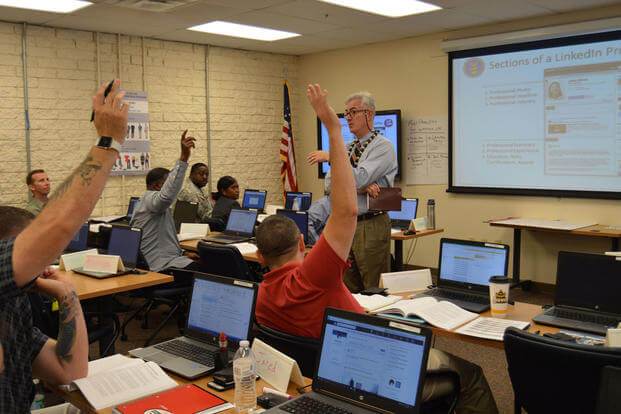Joanna Graham is chief marketing officer of the HR Certification Institute (HRCI). James Schmeling is executive vice president of Student Veterans of America (SVA).
Career-oriented service members transitioning into the civilian workforce require more than just a job to pay their bills. They want greater earning power, an elevated entry into the civilian market, and significantly higher overall career satisfaction.
Thanks to emerging program opportunities offered by veteran service organizations such as Student Veterans of America (SVA), as well as other veteran-focused programs from professional career institutions like the Human Resources Certification Institute (HRCI), transitioning service members now have free and discounted access to a wide range of nationally recognized professional certifications, providing a career advantage as they join a competitive civilian job market.
Military personnel, from the start of their service, repeatedly adapt to new roles and expectations, and train for the road ahead. Getting trained and certified for a civilian career is in many ways just another training program for a new responsibility in a new environment.
Col. Dan Friend, U.S. Army Chief of Staff Senior Fellow at Northwestern University, Kellogg School of Management, explains the advantage from an Army perspective: "You start with initial training, and you constantly return to training, whether it's in your unit, through personal development, or in a formal school as you progress through your career. We end up with a group of people who, frankly, have a growth mindset."
A military background provides an invaluable resume of skills, education and experience. Military personnel are proven self-starters with a strong work ethic -- traits that enrich company culture and morale, as well as increase business productivity.
Yet, even with your solid resume in hand, professional development experts still advise that career certifications are a proven career advantage in the civilian workforce.
Natasha Brown, CEO of the talent management and leadership consulting firm Performance ReNEW, says that obtaining a professional certification in your career field is the No. 1 way to take charge of your professional development.
"A graduate certificate program, though not as involved as a full-blown graduate degree, allows the career-oriented professional an opportunity to develop industry-specific skills. … A graduate certificate in business or human resources just might be the ticket to that next promotion or a more specialized post at the organization down the street," Brown said.
Certifications are also often among recruiters' top criteria.
If a professional certification helps a career-oriented civilian professional in their path, a transitioning service member needs that same certification if they want to stay competitive in their field.
HRCI has carved out a unique program with an aim to bridge the gap between military and civilian HR by waiving application fees for Professional in Human Resources (PHR) certifications.
A service member, veteran or military spouse serving in the armed forces can earn credentials from HRCI to enhance their professional development in human resource management. For those transitioning out of service, an HRCI credential is a must-have to translate military experience into a civilian business role managing people as resources.
Mark Hickman, HR Warrant Officer Career and Leader Development Chief at U.S. Army Adjutant General School, said certification validated that his "knowledge and mastery of HR principles learned in the Army would translate to civilian HR."
Like most professional certifications, the PHR series of certifications distinguishes you as an expert in the HR field, with proven levels of skills and knowledge, and the competence necessary to mitigate risks and drive business results.
Recognizing the relevance of the highly competitive, yet lucrative, IT job market, Student Veterans of America (SVA) wants to help its membership gain entry to the 150,000 open IT support jobs across the United States. The average IT professional's starting salary is $52,000.
SVA offers student veterans and their spouses free access to a five-course IT Support Professional Certificate, developed by Google, and includes innovative curriculum designed to prepare for an entry-level role in IT support. A job in IT translates into an in-person or remote help desk position in a small business or at a global company, like Google.
SVA also has partnered with the Institute for Veterans and Military Families' Onward To Opportunity program that helps student veterans and military spouses obtain professional training and certifications at no cost. Certification options include: HRCI's PHR certifications, as well as PMP, CISSP, Security+, CCNA and Network+.
Career institutions such as HRCI and veteran service organizations like SVA are committed to helping career-oriented service members -- while they serve, during transition and after separation from the military -- stand out from the competition.
No matter where you are in your transition process, whether getting ready to leave the military, in your first job, or in school, certifications can bolster your career.
By translating your skills into a language private-sector recruiters and hiring managers will understand, certifications give transitioning service members a clear career advantage in today's job market.
-- The opinions expressed in this op-ed are those of the author and do not necessarily reflect the views of Military.com. If you would like to submit your own commentary, please send your article to opinions@military.com for consideration.















